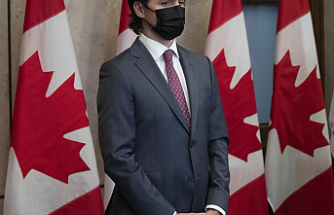The trucker protests against the US vaccine mandates have caused losses of almost $300 million in wages, production, and wages in the automotive industry.
According to the analysis of Anderson Economic Group, which is based in East Lansing (Michigan), the demonstrations caused direct wage losses totaling $144.9 Million. These losses mostly affected Michigan and Ontario from Tuesday to Tuesday.
Anderson stated in a statement Monday that General Motors and Ford, Chrysler, Honda, Honda, and Toyota lost $155 million during the same period.
The group stated that Michigan's lost wages alone, after just one week of protests, totalled more than $51 millions.
Patrick Anderson, chief executive officer of the economic group, stated Tuesday that protests had caused "painful shutdowns" in Canada and the U.S.
He said that three-hundred million dollars in losses in just eight days was quite a lot of loss. It's very distressing and visible in Ontario, Michigan and down to Kentucky and Ohio.
According to the study, the bridge protests were a result of the industry's already-problematic supply chain issues due to the pandemic.
Anderson stated in the statement that many of the cars not produced over the past ten working days won't be delivered to customers who would have purchased them. "Those customers are either already moving on to other destinations or will simply go without a car at this point."
"Within hours after the trade disruption at Blue Water bridges and Ambassador, we saw shortages and then slowdowns in assembly plants. Given the tight supply chain in the auto industry, only a small amount of this lost production can be recovered. These are serious losses for the men and women who work in this industry.
The group concluded that nearly $300 million of losses were caused by lost production at assembly plants, delays at transit employers and other factors. Only the lost or delayed portion of missed wages was included in the study's production costs and missed wages.
According to the study, the loss estimate assumes that more than 90% of the disruption trade volume reaches destinations within a time frame where it can be productively used.
After clearing a blockade, the Ambassador Bridge was opened on Sunday.
Detroit International Bridge Company, the owner and operator of the bridge, stated in a statement that it was "allowing the free flow commerce between the U.S. and Canada economies."
Drew Dilkens, Windsor Mayor, had announced the end to the demonstration earlier in the day.
He released a statement saying that "Today, the national economic crisis at Ambassador Bridge has come to an end."
Numerous arrests were made and many vehicles were seized. Pam Mizuno was the deputy chief of Windsor police and echoed the declaration at an afternoon news conference. The bridge was still closed at that time.
Protests in Canada have attracted support from right-wing extremists as well as armed citizens. They have been cheered by conservatives like former President Donald Trump in the U.S.
To quell protests, Justin Trudeau , Canadian Prime Minister, invoked emergency powers Monday. This declaration grants the federal government broad power to restore order.
He assured that emergency measures would be limited in time, targeted geographically, reasonable, and proportionate to the threat they were meant to address.
After meeting virtually with provincial leaders, Trudeau stated that "these blockades were illegal" and that he was ready to end them.
Similar protests were held in France, New Zealand, and the Netherlands. According to U.S. authorities, truck protests could be on the horizon in the United States.









